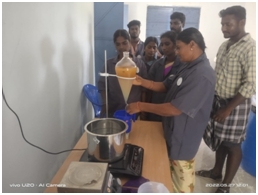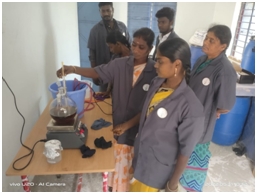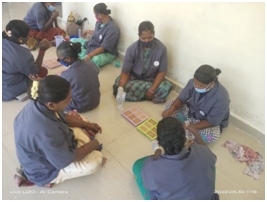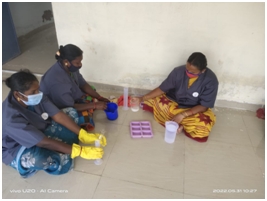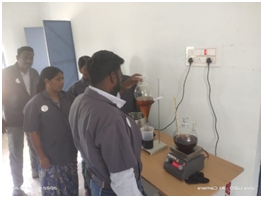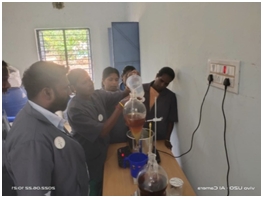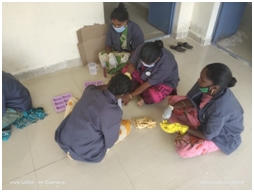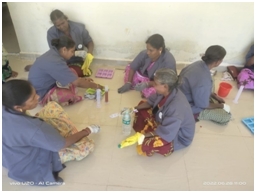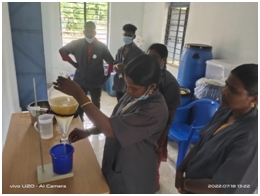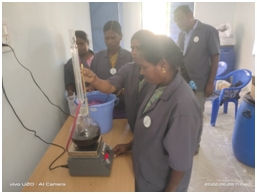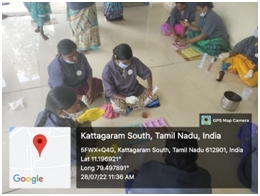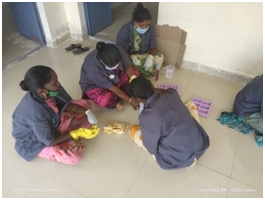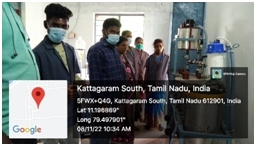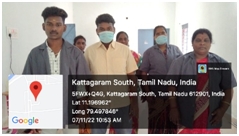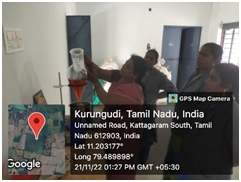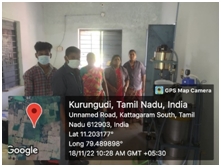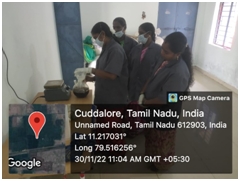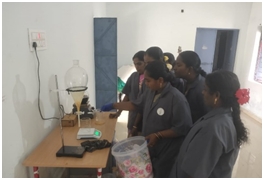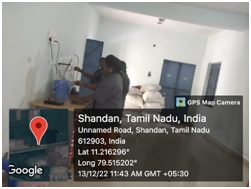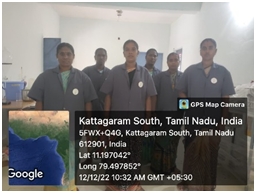The training was given to 209 people in both the villages Adhanur and Echampoondi in a rotational basis as in all the interventions
Echampoondi Village
22 beneficiaries of Eachampoondi were trained. A dedicated team for soap making and biodiesel production were identified, to be involved in the large-scale production of detergent soaps and biodiesel which is expected to be implemented in August 2022.
Safety training was also given to the beneficiaries.
The impact of the chemicals handled during soap and biodiesel production were also explained.
The importance of diverting Waste Cooking Oil for Soap and Biodiesel production from both environmental and health perspectives were detailed to the beneficiaries.
The by-products and waste generated during biodiesel production and how they need to be managed were also explained to the beneficiaries.
The beneficiaries were also briefed about how they need to involve themselves in marketing the products made. They were allowed to share their opinion to promote the marketing of the products.
A total of 475 soaps were made. Of which 400 were identified suitable for sales.
A total of 9L biodiesel was produced. Preliminary tests to evaluate the raw oil's suitability for biodiesel production and product quality were also taught to the beneficiaries.
On an average more than 85% attendance was witnessed on all days of the training. The training was successfully completed for the first batch of 22 beneficiaries on 2nd June 2022. Of the total beneficiaries, 17 are women.
22 beneficiaries of Eachampoondi were trained. A dedicated team for soap making and biodiesel production were identified, to be involved in the large-scale production of detergent soaps and biodiesel which is expected to be implemented in August 2022.
Safety training was also given to the beneficiaries.
The impact of the chemicals handled during soap and biodiesel production were also explained.
The importance of diverting Waste Cooking Oil for Soap and Biodiesel production from both environmental and health perspectives were detailed to the beneficiaries.
The by-products and waste generated during biodiesel production and how they need to be managed were also explained to the beneficiaries.
The beneficiaries were also briefed about how they need to involve themselves in marketing the products made. They were allowed to share their opinion to promote the marketing of the products.
A total of 428 soaps were made. Of which 380 soaps were identified suitable for sales.
A total of 9L biodiesel was produced. Preliminary tests to evaluate the raw oil's suitability for biodiesel production and product quality were also taught to the beneficiaries.
On an average more than 85% attendance was witnessed on all days of the training. The training was successfully completed for the second batch of 22 beneficiaries on 28th June 2022. Of the total beneficiaries, 20 are women.
18 beneficiaries of Eachampoondi were trained. A dedicated team for soap making and biodiesel production were identified, to be involved in the large-scale production of detergent soaps and biodiesel which is expected to be implemented in August 2022.
Safety training was also given to the beneficiaries.
The impact of the chemicals handled during soap and biodiesel production were also explained.
The importance of diverting Waste Cooking Oil for Soap and Biodiesel production from both environmental and health perspectives were detailed to the beneficiaries.
The by-products and waste generated during biodiesel production and how they need to be managed were also explained to the beneficiaries.
The beneficiaries were also briefed about how they need to involve themselves in marketing the products made. They were allowed to share their opinion to promote the marketing of the products.
A total of 393 soaps were made. Of which 380 soaps were identified suitable for sales.
A total of 9L biodiesel was produced. Preliminary tests to evaluate the raw oil's suitability for biodiesel production and product quality were also taught to the beneficiaries.
On an average more than 85% attendance was witnessed on all days of the training. The training was successfully completed for the second batch of 18 beneficiaries on 28th June 2022.
06 beneficiaries of Eachampoondi were trained. A dedicated team for biodiesel production were identified, to be involved in the large-scale production of biodiesel which is expected to be implemented in August 2023.
Safety training was also given to the beneficiaries.
The impact of the chemicals handled during soap and biodiesel production were also explained.
The importance of diverting Waste Cooking Oil for Biodiesel production from both environmental and health perspectives were detailed to the beneficiaries.
The by-products and waste generated during biodiesel production and how they need to be managed were also explained to the beneficiaries.
The beneficiaries were also briefed about how they need to involve themselves in marketing the products made. They were allowed to share their opinion to promote the marketing of the products.
A total of 40L biodiesel was produced. Preliminary tests to evaluate the raw oil's suitability for biodiesel production and product quality were also taught to the beneficiaries.
On an average more than 99% attendance was witnessed on all days of the training. The training was successfully completed for the fourth batch of 06 beneficiaries on 23rd Nov 2022.
06 beneficiaries of Eachampoondi were trained. A dedicated team for biodiesel production were identified, to be involved in the large-scale production of biodiesel and the making which is expected to be implemented in April 2023.
Safety training was also given to the beneficiaries.
The chemicals' impact during biodiesel production was also explained.
The importance of diverting Waste Cooking Oil for Biodiesel production from both environmental and health perspectives were detailed to the beneficiaries.
The by-products and waste generated during biodiesel production and how they need to be managed were also explained to the beneficiaries.
The beneficiaries were also briefed about how they need to involve themselves in marketing the products made. They were allowed to share their opinion to promote the marketing of the products.
A total of 20L biodiesel was produced. Preliminary tests to evaluate the raw oil's suitability for biodiesel production and product quality were also taught to the beneficiaries.
On average more than 85% attendance was witnessed on all days of the training. The training was successfully completed for the fourth batch of 06 beneficiaries on 14th Dec 2022.
